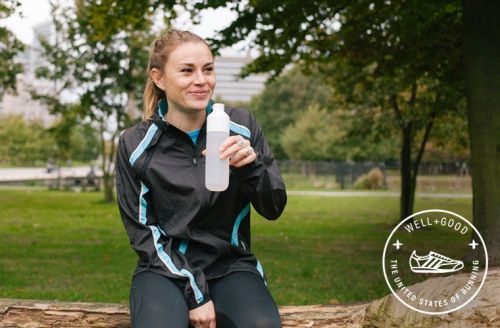Our editors independently select these products. Making a purchase through our links may earn Well+Good a commission
Runners have long been trained to view carbs as the perfect recovery fuel. (Remember those team spaghetti dinners in high school?) But now that your metabolism might not be as fast as it was when you were 17, does that advice still ring true? And exactly how many miles warrants a big bowl of bolognese?
It turns out that while pasta isn’t off the table completely, there’s a smarter way to refuel that’s better for your body. It’s something chef and runner Elyse Kopecky knows first-hand. The co-author of Run Fast. Eat Slow., she’s become the person runners turn to for nutrition advice. (Kopecky and her co-writer, marathoner and Olympian Shalane Flanagan—who just became the first American woman to win the New York City Marathon in 40 years—are releasing another cookbook in 2018, so be on the lookout.)
She shares her advice along with registered dietitian Nancy Clark, RD—a respected sports nutritionist who has written four books on the subject.
Scroll down to find out the best way to refuel your body after a run.

What your body needs immediately
If you log a couple miles a few times a week, that’s amazing for your body but Clark says you don’t necessarily need to worry too much about refueling. “Assuming someone at least ate something before their run, like a banana, people will often actually overeat” after their workout, she says. It’s sort of like adding gas to your car when you haven’t even used most of what’s in the tank yet.
Instead of defining what you need based on a specific number of miles logged, Kopecky says a better way to go is to actually take a minute and think about what your body is communicating to you. “We’re bombarded with information about calorie count, needing ‘x’ amount of carbs, and ‘x’ amount of protein. All these numbers make it hard to listen to our bodies and hunger signals,” she says. Your body will communicate to you how much recovery fuel you need. (If you’re training for a marathon and just did a long weekend run, chances are you’ll feel pretty famished when you get home.)
“We’re bombarded with information about calorie count, needing ‘x’ amount of carbs, and ‘x’ amount of protein. All these numbers make it hard to listen to our bodies.”
When you check in with yourself, you’ll likely feel that you need at least a little fuel, and both experts say the best post-run snack has both carbs and protein. “Things like a peanut butter sandwich or yogurt with granola are a great choice,” Clark says.
Kopecky adds that a well-balanced smoothie is another good option since hydration is something else your body needs post-run. “Whole-milk yogurt—or nut butter, if you’re dairy-free—gives a nice protein-fat balance, and when you add in some veggies or fruit, you’ll get a nice mix of other nutrients, too,” she says. She also adds ginger to all her smoothies to fight inflammation flare-ups the body could experience after a strenuous workout.

For your post-run meal
When it comes to your actual sit-down meal—whether that’s your breakfast after an early morning run or dinner—both experts say that same protein-carb balance is important. “The best carbs are going to be complex carbs, which have other nutrients,” Kopecky says. One of her favorite post-run meals is an egg scramble with spinach and roasted sweet potato fries. “The sweet potatoes are a nutrient-dense complex carb, the eggs have good protein and healthy fat, and the spinach adds iron—something you lose through exercise,” she explains.
But if you still want that big bowl of pasta, go for it. “Pretty much every runner loves pasta, myself included,” Kopecky says. “You can make it a really balanced meal with meat sauce made with grass-fed beef and adding veggies in.”
Some other carb-protein meal ideas: oatmeal with nut-butter, chicken and rice, or one of Clark’s favorites, chicken noodle soup. “It has protein, carbs, vegetables, and also water and salt—both of which you likely lose a lot of through sweating.”

How to hydrate
Clark brings up an important point—hydration is a crucial part of refueling. Instead swigging plain H20, Kopecky concocted her own workout recovery drink: “I mix coconut water with tap, fresh squeezed lemon juice, molasses, and sea salt,” she says. “The coconut water has great electrolytes, the sea salt has sodium you lose through sweating, and molasses has great nutrients,” she says.
Kopecky also stresses that it’s important to hydrate throughout the day—so, pre- and post-run—but too much water right after you work out can actually flush nutrients right out of your body. “You can deplete all your electrolytes and minerals by over-hydrating, which can be really dangerous,” she says.
The best advice, just like with food, is to listen to your body. There’s a reason you get thirsty and hungry. And once you give your body what it wants, you’ll be rewarded by being ready to go hard on your next long run.
Alcohol can affect your run, too. Here’s how. Plus, five thoughts you’re bound to have during your first long run.
More from the United States of Running

Read the latest on Flipboard

Don't miss a single video on YouTube

More running tips from the pros
Sign up for the Well+Good SHOP Newsletter
Get exclusive deals on wellness, beauty, fitness, and food products that have been hand-picked by our editors.
Got it, you've been added to our email list.











